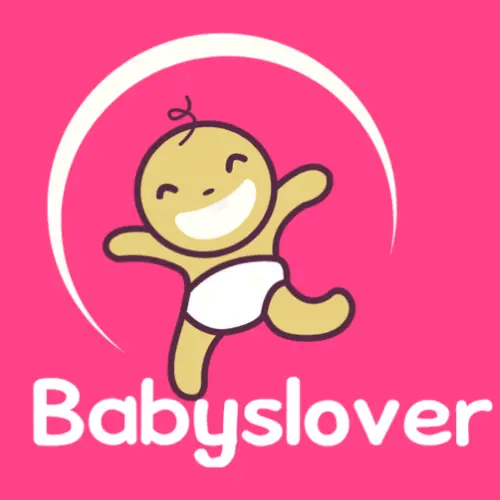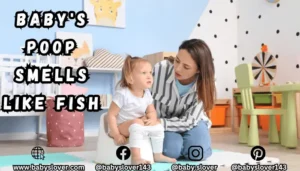After becoming a mother, I gradually became familiar with my baby’s Poop. I learned quickly what was normal and what wasn’t when it came to smell, frequency, and color. But when I caught the first whiff of something fishy in my baby’s diaper, I panicked. suddenly Baby’s Poop Smells Like Fish Was something wrong with my breastmilk? Could he have an infection? As an anxious new Mom, a million worries swirled through my mind.
If your child’s stool also smells like fish. Then I can understand your situation very well. So, in this article, I shared the causes and treatments for fishy-smelling poop in baby’s that my child’s pediatrician told me and what I found out.
Because let’s be honest, as moms, we get up close and personal with enough dirty diapers to become poop experts! So if your baby’s poop smells like fish, don’t fret. Here’s my guide to deciphering what’s normal and what’s not when it comes to your little one’s smelly poop.

Contents
Is It Normal Baby’s Poop Smells Like Fish?
While breastfed baby poop has a sweet, mild smell, a truly fishy odor is not normal or healthy. Some poop smell is expected, but a persistent fish-like aroma likely signals an underlying issue.
Healthy breastfed stools will be yellowish, loose, and have a mild, inoffensive scent. Formula-fed baby poop is pasty with a stronger smell, but still shouldn’t be overtly fishy.
If your baby’s poop smells like fish regularly, don’t panic, but do pay close attention and contact their doctor. Foul-smelling stools can be a symptom of various digestive or infection issues.
Why does my baby’s poop smell like fishy?
There are a few possible causes of fishy smelling baby poop:
- Sensitivity to something in mom’s diet: If breastfeeding, something mom ate like shellfish, eggs, or dairy could be passing through the breastmilk. Eliminating potential triggers from mom’s diet may help.
- Infection: Gastrointestinal infections from bacteria or parasites can cause fishy smelling poop. Infections like salmonella need medical treatment.
- Antibiotics: After antibiotic use, baby’s gut microbiome is disrupted, sometimes causing smelly poop. This should resolve after antibiotics are finished.
- Digestive enzyme insufficiency: Conditions like lactase deficiency mean baby can’t properly digest components of breastmilk or formula. This malabsorption leads to smelly stools.
- Bowel obstruction: Rarely, a blocked bowel prevents proper digestion, causing odorous poop. This requires prompt medical attention.
If the fishy smell persists, have baby examined by a pediatrician to determine the underlying cause.
What Should I do if my Baby’s fishy smelling poop?
Here are some tips if your baby has fish-scented poop:
- Discontinue any new foods for now, and eliminate common allergens from mom’s diet if breastfeeding. Dairy, eggs, shellfish, wheat, and soy are frequent culprits.
- Keep baby well-hydrated with breastmilk or formula while avoiding water.
- Watch for other worrisome symptoms like fever, vomiting, blood, decreased appetite, or crying/pain with pooping.
- Sanitize diaper changing area and wash hands well after every diaper change to prevent infection spread.
- Take a photo of the poop to show the pediatrician. Detailed descriptions of color, consistency, and smell will help diagnosis.
- Seek medical attention if smell persists more than 1-2 days, if baby seems ill, or additional symptoms appear.
- Probiotic drops can help restore healthy gut flora after antibiotic use. Consult your pediatrician.
While alarming, a fishy odor alone does not definitely indicate a serious problem. Still, be vigilant about any symptoms until the smell resolves.
When To Worry for Baby’s Fishy smelling poop?
Here are some key points on when to worry about baby fishy smelling poop:
- Consult your pediatrician if the fishy smell persists or keeps recurring after multiple diaper changes or bowel movements. A persisting odor is not normal.
- Contact your doctor if the fishy smell is accompanied by other symptoms like diarrhea, vomiting, decreased appetite, fever, etc. These could signal an underlying infection or condition.
- Seek medical advice if baby seems particularly uncomfortable, irritable, or in pain when passing the smelly stools. This could indicate a bowel obstruction or other issue causing discomfort.
- Watch for signs of dehydration from fluid loss like decreased wet diapers, dry mouth, sunken eyes or fontanelle, irritability, and lethargy. Dehydration requires prompt medical treatment.
- Pay attention if baby is not gaining weight appropriately or is falling off their growth curve. Poor nutrient absorption from gut issues can impact growth.
- Be concerned if there is blood or mucus in the stool along with the fishy smell. This warrants notifying your doctor.
- Seek evaluation if the fishy smell starts suddenly and represents a significant change from baby’s normal odor. Sudden changes deserve investigation.
While fishy poop smell alone isn’t necessarily an emergency, always contact your doctor for assessment and guidance when concerned about your baby’s symptoms.
Read Also Why Does Your Toddler’s Poop Smells Like Mothballs?
Related Frequently Asked Questions
What to do if poop smells like fish?
If your baby’s poop smells like fish, contact your pediatrician, especially if it persists or is accompanied by other symptoms. Eliminate potential trigger foods from your own diet if breastfeeding. Keep your baby hydrated and monitor for dehydration signs. Sanitize the diaper area and wash hands thoroughly after changes.
Is it normal for baby poop to smell bad?
No, consistently foul, fishy smelling poop is not normal for a healthy baby. Some odor is expected, but a truly bad, fishy smell usually indicates an underlying problem needing medical attention.
Why does my baby’s poop smell like green and fishy?
Green, fishy smelling baby poop could indicate:
An infection like salmonella or cholera
A food sensitivity if mom ate something that passed through breastmilk
An intestinal blockage preventing proper digestion
Bring a diaper sample and contact your pediatrician if it persists.
Why does my 1 year old poop smell like fish?
At 1 year old, a fishy smell could be from:
1. An infection like giardiasis from unhygienic conditions
2. A reaction to a new food introduced to their diet
3. Antibiotic use disrupting gut flora
4. Issues with nutrient absorption
Conclusion On Baby’s Poop Smell Like fish
It’s understandably upsetting when your precious baby’s poop smells like fish. While gross, it’s rarely an emergency on its own. In most cases, identifying and eliminating the cause resolves the fishy odor.
Still, do contact your pediatrician promptly for an assessment when concerned. With a few diet modifications and doctor’s guidance, your baby’s poop smell should go back to normal.

